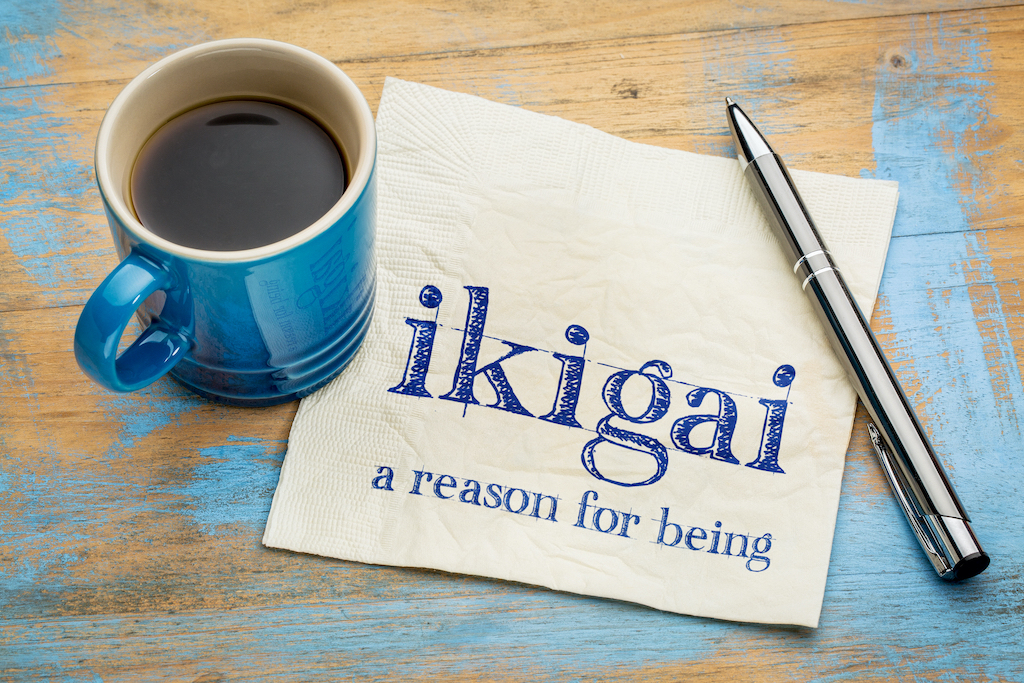Ikigai is much more than the new buzzword of personal development and coaching.
The term was first used in Japan as early as the 8th century and is the concatenation of “iki” (生き) [life] and “gai” (甲斐) [value or worth]. It therefore can be translated as “Reason for being”, “Reason for waking up in the morning” or “Finding happiness in life through purpose”.
It is now commonly associated to Okinawa Island, whose inhabitants have deeply integrated the concept of Ikigai in their daily life. Okinawa happens to be one of the very few places in the world which have a record number of happy centennials.
You may have already heard or read about the “Okinawa Diet”. It was long thought that this diet was the secret behind the longevity of Okinawans. Scientists have recently discovered another determining factor: a deep understanding of their Ikigai, their reason for being.
As children, Okinawans are encouraged to ask themselves what motivates them, what makes them want to get up in the morning, how the activities they enjoy to do can serve their community.
Everyone, according to the Japanese, has one or sometimes several hidden ikigai.
Now how do we find our ikigai? This requires introspection, self-awareness, identifying and letting go our preconceptions and the “masks” we start wearing as adults to try to project an external image we are not really aligned with.
It is actually simpler than it looks, as it requires intuition more than a complex intellectual process. It is all about learning to listen to our instincts, trust ourselves, find the inner compass we all have during childhood and very often lose when we grow up.
The quest for our ikigai is really worth it. Knowing and finding our ikigai will help us make the best personal and professional decisions.
Here are some tips to start your quest:
Ask yourself these four questions. Answer them without thinking too much, letting come whatever comes in your mind. Do not censor your own self, even and particularly if it seems stupid or irrelevant.
What do I like to do effortlessly, without seeing time go by?
This question may seem simplistic. However when was the last time you asked it? A very good way to answer it is to go back to your childhood and think about what drove you most, before being told it was useless or impossible. Another way: think about the activities that make you feel alive, those who make you scroll through the hours like seconds and which you are proud of.
What are my talents? My gifts? The ones I don’t recognize as such because I master them so much that I don’t see these are real talents.
To answer the question, look at the compliments you get from others, it is a good start. To go further, ask five people you know to tell you what they think are your best qualities. Also look at what you achieved easily but which seems complex or even impossible for others, even and especially what you think is trivial or unnecessary. We tend to underestimate our talents as they seem so obvious and easy to us.
What could motivate me in the long run?
Think about your core values, those that are essential to your well being. Another way is also to write down what you cannot stand, for example noise, crowds, violence? Then you associate to each item its opposite: calm or harmony for noise, being alone for crowd, peace for violence. These opposites are good examples of your sources of motivation.
How would I like to contribute to a better world?
Ask yourself in which world you would like to live. Don’t be afraid to have a vision. Dare to imagine your ideal world. For example write a sentence which could represent how you would describe to a friend the world of your dream in 20 years. Then identify some actions you could take very concretely to help move things in that direction.
Now look at your answers to these 4 questions. You have before your eyes a draft definition of your ikigai. This is a great first step to find it!
